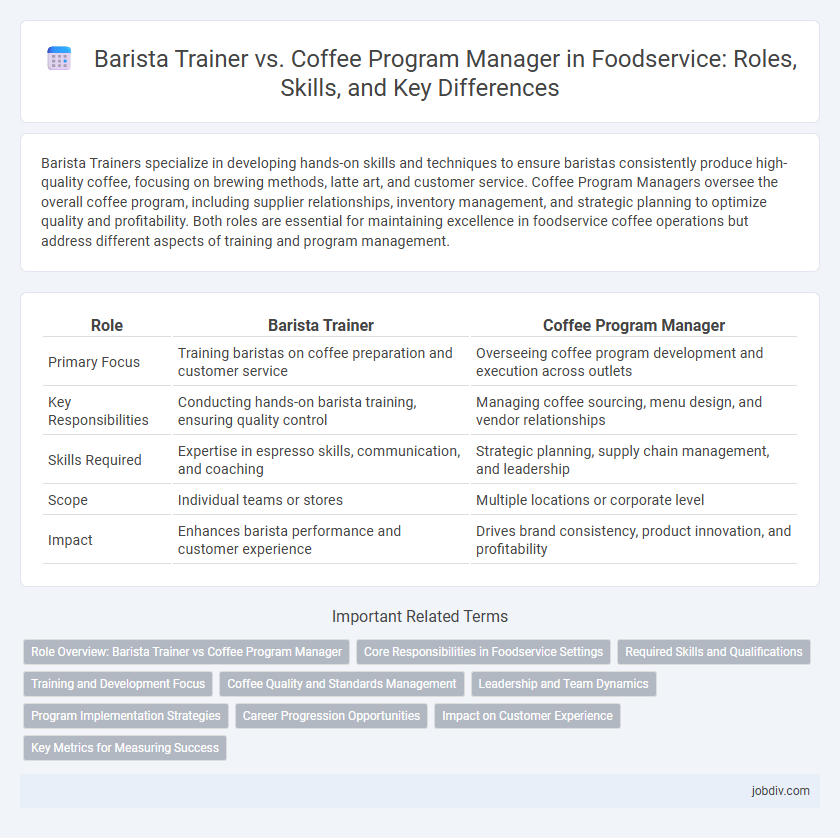Barista Trainers specialize in developing hands-on skills and techniques to ensure baristas consistently produce high-quality coffee, focusing on brewing methods, latte art, and customer service. Coffee Program Managers oversee the overall coffee program, including supplier relationships, inventory management, and strategic planning to optimize quality and profitability. Both roles are essential for maintaining excellence in foodservice coffee operations but address different aspects of training and program management.
Table of Comparison
| Role | Barista Trainer | Coffee Program Manager |
|---|---|---|
| Primary Focus | Training baristas on coffee preparation and customer service | Overseeing coffee program development and execution across outlets |
| Key Responsibilities | Conducting hands-on barista training, ensuring quality control | Managing coffee sourcing, menu design, and vendor relationships |
| Skills Required | Expertise in espresso skills, communication, and coaching | Strategic planning, supply chain management, and leadership |
| Scope | Individual teams or stores | Multiple locations or corporate level |
| Impact | Enhances barista performance and customer experience | Drives brand consistency, product innovation, and profitability |
Role Overview: Barista Trainer vs Coffee Program Manager
Barista Trainers focus on developing and enhancing baristas' skills through hands-on coaching, quality control, and ensuring consistent coffee preparation standards within foodservice environments. Coffee Program Managers oversee the entire coffee service operation, including supplier relationships, menu development, cost management, and strategic planning to elevate the coffee program's profitability and brand reputation. Both roles require deep coffee knowledge, but Barista Trainers emphasize skill cultivation, whereas Coffee Program Managers drive program execution and business outcomes.
Core Responsibilities in Foodservice Settings
Barista Trainers specialize in hands-on skill development, focusing on proper espresso extraction, milk frothing techniques, and drink consistency to ensure quality in daily coffee service operations. Coffee Program Managers oversee the broader coffee program, managing supply chain logistics, vendor relationships, and menu innovation to align with brand standards and customer experience goals. Both roles are critical in foodservice settings, with Barista Trainers executing direct employee training and Coffee Program Managers driving strategic program success.
Required Skills and Qualifications
Barista Trainers require hands-on expertise in coffee preparation, customer service skills, and the ability to teach brewing techniques effectively to entry-level staff. Coffee Program Managers demand advanced knowledge in coffee sourcing, inventory management, staff training program development, and proficiency in strategic planning to optimize coffee operations. Both roles benefit from strong communication skills and a deep understanding of coffee culture, but managers typically need leadership experience and analytical abilities to oversee multiple locations or broader program initiatives.
Training and Development Focus
A Barista Trainer specializes in hands-on skill development, emphasizing proper espresso techniques, equipment maintenance, and customer interaction to ensure consistent beverage quality. In contrast, a Coffee Program Manager oversees comprehensive training strategies, curriculum design, and performance metrics to align barista skills with brand standards and operational goals. Both roles are critical in elevating coffee expertise but differ in scope, with the trainer delivering direct instruction and the manager focusing on programmatic growth and development.
Coffee Quality and Standards Management
Barista Trainers specialize in hands-on skills development, ensuring consistent coffee quality by teaching precise brewing techniques and equipment maintenance. Coffee Program Managers oversee comprehensive coffee quality management, setting standards, sourcing beans, and managing vendor relationships to maintain flavor profiles across multiple locations. Both roles are critical for sustaining high-quality coffee experiences but differ in scope, with trainers focusing on execution and managers on strategic standards implementation.
Leadership and Team Dynamics
Barista Trainers specialize in hands-on leadership, directly coaching baristas to enhance brewing skills and customer service quality, fostering a cohesive team environment on the floor. Coffee Program Managers oversee broader operational strategies, driving team dynamics by aligning training programs with business goals to ensure consistent product quality and brand standards. Both roles require strong leadership, but Barista Trainers focus on day-to-day team engagement, while Coffee Program Managers prioritize strategic management and cross-functional collaboration.
Program Implementation Strategies
Barista Trainers excel at hands-on skill development and daily operational techniques, ensuring consistent quality and adherence to coffee preparation standards. Coffee Program Managers focus on strategic oversight, integrating supply chain logistics, brand consistency, and training program scalability across multiple locations. Combining the tactical execution from Barista Trainers with the strategic planning of Coffee Program Managers drives effective program implementation and long-term success in foodservice coffee operations.
Career Progression Opportunities
Barista Trainers develop foundational skills by coaching staff on espresso techniques and customer service, building expertise essential for advancing within foodservice operations. Coffee Program Managers leverage this hands-on experience to design comprehensive training programs, manage vendor relationships, and oversee quality control across multiple locations, positioning themselves for leadership roles. Career progression commonly transitions from Barista Trainer to Coffee Program Manager, expanding responsibilities from frontline training to strategic program management.
Impact on Customer Experience
A Barista Trainer directly enhances customer experience by improving baristas' skills, ensuring consistent beverage quality and faster service. A Coffee Program Manager impacts customer satisfaction on a broader scale by designing strategic coffee initiatives, selecting quality products, and integrating innovative service offerings. Both roles contribute to customer loyalty, but the trainer influences daily interactions while the program manager shapes long-term brand perception.
Key Metrics for Measuring Success
Barista Trainer success is measured by improvements in employee skill assessments, reduced training time, and increased customer satisfaction scores. Coffee Program Manager metrics focus on program adoption rates, sales growth of coffee products, and consistency in brand standards across locations. Both roles benefit from analyzing return on investment (ROI) in training and program initiatives to optimize operational efficiency.
Barista Trainer vs Coffee Program Manager Infographic

 jobdiv.com
jobdiv.com